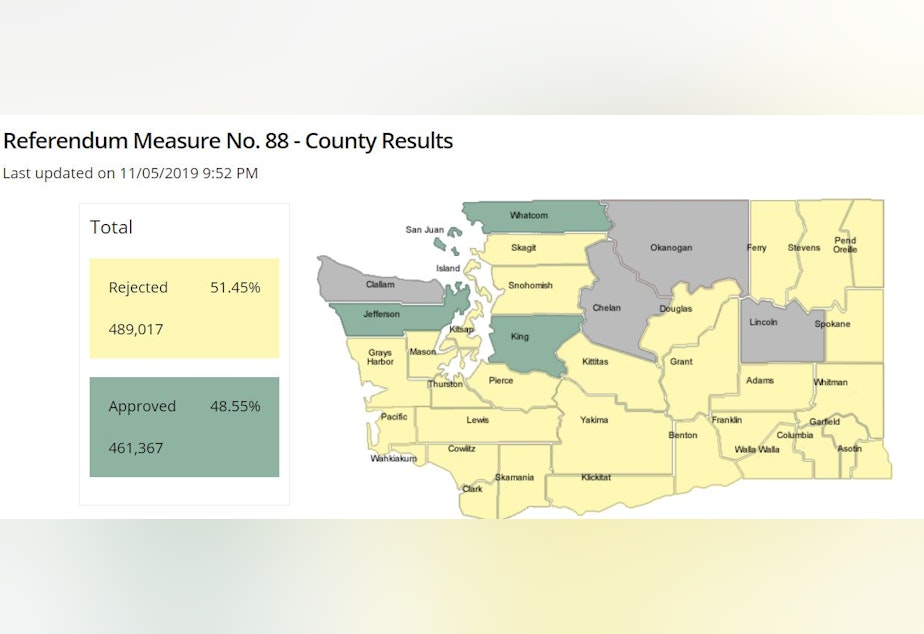Washington voters narrowly rejecting affirmative action

In a potential rejection of a vote earlier this year by state lawmakers, Washington voters on Tuesday evening were narrowly saying “no” to restoring affirmative action in the state.
The vote to reject Referendum 88 and overturn Initiative 1000, the affirmative action measure that previously passed the Legislature, was 51 percent to 49 percent as of 10 p.m.
“We’re cautiously optimistic,” said Linda Yang of the campaign to reject Referendum 88.
Supporters of affirmative action, however, were not ready to concede defeat.
“Nothing is final until it is certified,” said Jesse Wineberry, the co-chair of the Initiative 1000 campaign.
Initiative 1000 was an Initiative to the Legislature this year that sought to once again allow the state to consider factors like race and gender in public employment, contracting and education.
Sponsored
After majority Democrats passed the measure in the final hours of the Legislative session this April, opponents gathered enough signatures over the summer to put the new law to a public vote.
The opposition effort was led by a group of Asian Americans who said they feared their children would be passed over for university admissions in favor of other racial minorities.
“If we win, that sends a signal to elected officials to say people really don’t want to treat people different based on their race,” Yang said.
A mostly African American coalition delivered Initiative 1000 to the Legislature in January. This fall, a diverse coalition of business, labor and advocacy organizations, known as the Washington Fairness coalition, campaigned to protect the law from repeal.
“We knew that we had an uphill battle ahead of us,” said Hyeok Kim, a co-chair of the Washington Fairness campaign who noted that referendum measures are often confusing to voters.
Sponsored
“I think there were a lot of inherent challenges to this ballot measure and I think that there’s always going to be an asterisk with this vote because of that.”
Affirmative action supporters were hopeful that late-arriving ballots, especially in populous King County where Referendum 88 was overwhelmingly passing, would break their way.
Opponents were counting on strong opposition in places like Snohomish and Pierce Counties, where the vote to reject Referendum 88 was leading by more than 10 points, to help them ultimately prevail.
Among the most vocal advocates for bringing back affirmative action were Washington’s three living former governors: Republican Dan Evans and Democrats Chris Gregoire and Gary Locke. Current Gov. Jay Inslee also endorsed Initiative 1000.
Known as the Washington State Diversity, Equity and Inclusion Act, Initiative 1000 called for the restoration of affirmative action “without the use of quotas or preferential treatment.”
Sponsored
Preferential treatment was defined in the law as using factors such as race, gender or sexual orientation as the “sole qualifying factor to select a lesser qualified candidate over a more qualified candidate.”
The law, however, would allow non-quota-based “participation goals” and “outreach efforts.” The goal of Initiative 1000 was to allow affirmative action measures to remedy discrimination against “disadvantaged groups” defined as groups that had been identified through disparity studies or court cases.
The law also sought to create a new governor’s commission on diversity, equity and inclusion to enforce state compliance with the affirmative action law.
In a TV ad urging voters to reject the new affirmative action law, the reject R-88 campaign said the law would discriminate, create a “costly bureaucracy” and “enforce racial preferences.” Opponents also insisted that the law would create “racial quotas” and said Initiative 1000 would undo jobs preferences for veterans that have been in place in Washington since 1895.
Proponents countered that the law would help veterans by protecting them from discrimination in hiring, contracting and education.
Sponsored
The vote on Referendum 88 marks the first time in more than 20 years that Washington voters have weighed in on affirmative action. In 1998, voters overwhelmingly passed Initiative 200 which effectively ended affirmative action in the state.
The vote was part of a national effort to roll back policies designed to address racial and gender disparities in the public sphere. Washington was one of eight states to effectively ban affirmative action beginning in the mid-1990s.
Supporters of Initiative 1000 said Initiative 200 had serious consequential impacts, including a dramatic drop in the percentage of state dollars spent with minority- and women-owned businesses, from 13 percent in 1998 to about 3 percent in 2017, according to one study.
Despite the deep emotions sparked by affirmative action, neither side raised or spent large sums of money. According to the Public Disclosure Commission (PDC), the campaign to reject Referendum 88 raised about $1.4 million, much of it from the Seattle-area Chinese American community, but spent much of that money to qualify for the ballot.
Meanwhile, the Washington Fairness campaign to uphold Initiative 1000 raised nearly $1.2 million in recent weeks to defend the measure with funding coming from the Group Health Community Foundation, the Service Employees International Union and the American Civil Liberties Union. Several companies including Vulcan, Microsoft, Alaska Airlines and Puget Sound Energy also donated to the pro-affirmative action campaign, according to PDC filings.
Sponsored
The Washington Fairness campaign emerged this fall to defend Initiative 1000 after the original campaign committee, the One Washington Equality Campaign, led by former state legislator Jesse Wineberry, incurred $1.3 million in debt during the signature gathering drive last winter.
In September, two of the signature gathering firms that were hired to qualify Initiative 1000 as an initiative to the Legislature filed a breach of contract lawsuit alleging that they and some of their front line workers had gone unpaid.

